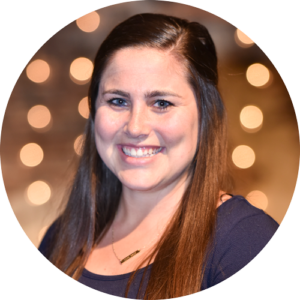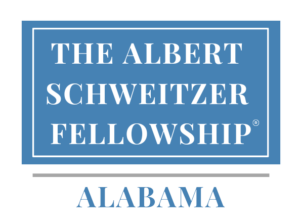By Javacia Harris Brown
Julie Mauldin was committed to helping patients at the Changed Lives Mobile Clinic (CLMC) long before she became an Albert Schweitzer Fellow. She has volunteered at the CLMC since starting nursing school four years ago. But through her fellowship, Julie can help the clinic in a deeper way.
“This gives me an opportunity to do some quality improvement projects along with my normal duties that I do with the clinic,” explains Julie, who is currently pursuing her nurse practitioner degree at the University of Alabama at Birmingham School of Nursing. “So it just enables me to help expand the capability of the clinic so we can provide better care for our patients. Just because you don’t have insurance at the time and you’re in a niche population doesn’t mean you don’t deserve efficient, quality health care.”
For her Albert Schweitzer Fellowship project, Julie is working with The Foundry’s Changed Lives Mobile Clinic, which serves men at the Changed Lives Christian Center, a faith-based organization that offers transitional housing to break the cycle of homelessness. Julie’s aim is to decrease health disparities in specialized populations—particularly those undergoing substance abuse disorder recovery. And she believes one way to do this is by increasing the efficiency and effectiveness of the clinics that serve these populations.
During her fellowship, Julie has developed educational materials for CLMC volunteers to utilize while implementing patient care to improve patient satisfaction. She’s also recruited and trained additional volunteers to help increase the efficiency of care and decrease patient wait times. But she’s most proud of the mobile laboratory she’s helped to develop.
“The Changed Lives Christian Center, which is where we have our base of operations, built us another room and it has all of our lab supplies in it, and it looks so great,” Julie says. “I was able to organize that and have all of our supplies up on the shelves appropriately. Everything is set up just the way I like it. So, I’m very happy about that.”
Julie created a laboratory manual and a policy and procedures book as well to ensure quality control for the lab equipment.
“The lab is like my special little baby,” she says.
Having a separate and well-organized, efficiently run lab helps Julie and other volunteers see more patients in a shorter time frame and give each patient quality care. A more efficient lab also means more accurate test results.
“The clinic has a long way to go, and it’ll have a long way to go after I’m gone, but I think looking at where it is now and where it was four years ago, I can say we have accomplished so much and we’ve seen it grow,” Julie says.
This growth will help the CLMC serve more patients in need. Currently, Julie works primarily with men who are a part of The Foundry Ministries addiction recovery program. Soon the clinic will be serving The Foundry’s women’s center in Bessemer as well.
As much as Julie loves the lab she’s helped to organize, she considers her patients her biggest success story.
“I love seeing the guys be happy and healthy,” she says. “You get to see them go from not sleeping at all to having the right antidepressant and getting better sleep.”
She’s seen patients with diabetes significantly decrease their A1C and patients with hypertension decrease their blood pressure.
This type of change happens through both quality care and patient education – which is a passion of Julie’s.
After graduating in 2026, Julie will have a primary care nurse practitioner certification with a sub-specialty in education, but she’s not aiming to teach at a university.
“I mainly did my education sub-specialty for patient education,” she says. “I want it to better enable me to teach patients appropriate health care techniques.”
Julie, who currently works as a nurse in the intensive care unit at UAB Hospital, hopes to work in a clinic setting like the CLMC after completing her current degree program.
“I want to work in a clinic or some sort of facility that provides care to those underserved populations,” she says. “Whether they have insurance or not, whether they be low income or not, they have the right to have access to quality care.”
After working as a health care provider for a few years, Julie plans to go back to school to pursue a Doctor of Nursing Practice degree with a focus on nurse leadership and population health.
“I’d like to do this to help combat the systemic issues that lead to healthcare inaccessibility in rural areas and in urban areas, because it’s more prevalent than you think,” she says. “I love working bedside and talking to these patients, but they don’t have to be there. There’s a reason they’re there, and that’s not just their fault.”
Julie knows teaching her patients healthy habits while providing them with the care they deserve is essential, she believes the work doesn’t stop there.
“Volunteering at the clinic and in my job as an ICU nurse at UAB, I see all of these issues arise and a lot of them are preventable,” she says. “Seeing all these things that could have been done differently to prevent them from going to the hospital makes me frustrated with the systems in place. I want to help ensure that people can have the appropriate systemic support to prevent them from facing all these complications.”



